#basavanna
Quote
The rich
will make temples for Śiva.
What shall I,
a poor man
do?
My legs are pillars,
the body the shrine,
the head a cupola
of gold.
Listen, O lord of the meeting rivers,
things standing shall fall,
but the moving ever shall stay.
Basavanna, ‘820.‘ in Speaking of Śiva, trans. A. K. Ramanujan.
omnia quae videntur perire mutari (Seneca, from Epistulae 36:11.)
❧
“Every soul is immortal. That is because whatever is always in motion is immortal, while what moves, and is moved by, something else stops living when it stops moving. So it is only what moves itself that never desists from motion, since it does not leave off being itself. In fact, this self-mover is also the source and spring of motion in everything else that moves; and a source has no beginning. That is because anything that has a beginning comes from some source, but there is no source for this, since a source that got its start from something else would no longer be the source. And since it cannot have a beginning, then necessarily it cannot be destroyed. That is because if a source were destroyed it could never get started again from anything else and nothing else could get started from it—that is, if everything gets started from a source. This then is why a self-mover is a source of motion. And that is incapable of being destroyed or starting up; otherwise all heaven and everything that has been started up would collapse, come to a stop, and never have cause to start moving again. But since we have found that a self-mover is immortal, we should have no qualms about declaring that this is the very essence and principle of a soul, for every bodily object that is moved from outside has no soul, while a body whose motion comes from within, from itself, does have a soul, that being the nature of a soul; and if this is so—that whatever moves itself is essentially a soul—then it follows necessarily that soul should have neither birth nor death.” (Plato, from Phaedrus, 245c-245e, trans. Alexander Nehamas and Paul Woodruff)
❧
“6.23 The Master said, “The wise take joy in rivers, while the Good take joy in mountains. The wise are active, while the Good are still. The wise are joyful, while the Good are long-lived.”
commentary: This is a famously cryptic passage. A somewhat neo-Daoist-flavored interpretation of the first two lines is provided by Bao Xian: “The wise take joy in actively exercising their talent and wisdom in governing the world, just as water flows on and on and knows no cease. The Good take joy in the sort of peace and stability displayed by mountains, which are naturally nonactive and yet give birth to all of the myriad things.” The precise meaning of the last line is particularly problematic. It is unclear why only the wise (and not the Good) should be joyful, for instance. As for “the Good are long-lived” statement, some commentators attempt to reconcile it with the premature death of Yan Hui by understanding it metaphorically: it is the reputation or beneficial influence of the Good person is long-lived. Others reject this strategy, arguing that—the isolated counter-example of Yan Hui aside—the Good are long-lived because they are calm and free of desire for external things. All of these interpretations are quite speculative.” (Confucius, from Analects: With Selections from Traditional Commentaries, trans. Edward Slingerland)
❧
“The world is but a perennial see-saw. Everything in it—the land, the mountains of the Caucasus, the pyramids of Egypt—all waver with a common motion and their own. Constancy itself is nothing but a more languid rocking to and fro. I am unable to stabilize my subject: it staggers confusedly along with a natural drunkenness. I grasp it as it is now, at this moment when I am lingering over it. I am not portraying being but becoming: not the passage from one age to another (or, as the folk put it, from one seven-year period to the next) but from day to day, from minute to minute. I must adapt this account of myself to the passing hour. I shall perhaps change soon, not accidentally but intentionally. This is a register of varied and changing occurrences, of ideas which are unresolved and, when needs be, contradictory, either because I myself have become different or because I grasp hold of different attributes or aspects of my subjects. So I may happen to contradict myself but, as Demades said, I never contradict truth. If my soul could only find a footing I would not be assaying myself but resolving myself. But my soul is ever in its apprenticeship and being tested. (Michel de Montaigne, from ‘III.2. Of repenting’ in The Complete Essays, trans. M. A. Screech)
7 notes
·
View notes
Text
The Sound of Familiarity
I was sitting in the Global Reading Room in our university and working on my history assignment. sitting, there plying at my keyboard, taking down notes, underlining important points and highlighting keywords when my mind randomly starts buzzing with the tune of some long-forgotten music. At first, it is a faint hum of the tune and then it became more and more pronounced. Taaanaanna na na na na...
and then it grew louder and louder and then so loud that it is no longer in my head, it has forced itself out of the shackles of my mind and is now resonating out of my laptop. the faint, intangible hum has wriggled out of my body and is now a song. like a butterfly breaking out of its cocoon. and it now presents itself before me, the butterfly of the song, flashing the wings of its ostentatiously beautiful lyrics on the faded screen of my laptop.
"Akkare Maathadi Pooje Maadi Anthovne Maadevaaaa... Ughe! Ughe! Elu Male Myaleli Kunthanavva...."
What is the name of the song? ...what is it? is it elu male myaleli...? no, it doesn't seem like it. must be hange kuniro hinge kuniro? And i glance at my screen, scenes from a film keep changing in quick succession. the image of a distinctively strong man of dusky complexion, ruffled hair, and stern expressions is constant in all photos. Shivanna. and then like the apricity of the morning sun, enveloping the body in a blanket of warmth, my mind is embraced tightly with memories from a past, long lost and forgotten. they hug me. and i scramble to hug them back, it is a long, tight embrace.
"Beta zara is taraf aajao"
"en akka? - uh haan didi-"
And like a tree recoiling at the strike of lightning, i crack back into consciousness. I move aside to let the didi sweep the carpet underneath and i am pulled out of my lucid dream and yanked back into reality. I glance out of the window and I see the flagpole- the silken flag majestically fluttering away. Elu male myaleli is still resonating from the laptop as i continue to stare at the flag. for once, this feels like my flag. my flag, my country, i belong here. This place, this college, the people, the trees, the building are all mine. it is my college and this is me.
#jangama#basavanna#linga#indiralakshmi#what'sonmymind#india#keepingitreal#life#writers of tumblr#desi blog#writers of india#exams#study#kannada#song#shivrajkumar#mahadeshwara#maadesa#write up#god#prayer#folk#folk songs#south india#karnataka#jindal#coming of age#law school#music#writersofindia
2 notes
·
View notes
Quote
For almost a thousand years since Basavanna, Karnataka formed its identity through a lively dialectic between the ‘living presence of a teacher’s mind’ and the ‘dominant national narrative’. What defines Karnataka is the rich history of the tension between the two. The best of Karnataka’s medieval scholarship was devoted to subversive and creative re-interpretations of older texts, not a mechanical adoption and extension. The Rohit Chakrathirtha Committee appears to have set aside the historical reality of the very spirit of learning in Karnataka as well as the principle of inclusion that Dr Ambedkar embedded in the Constitution.
GN Devy, ‘The spirit of Karnataka in jeopardy in textbooks’, Deccan Herald
#Deccan Herald#GN Devy#India#Karnataka#Basavanna#dialectic#national narrative#teacher’s mind#medieval scholarship#subversive re-interpretation#Rohit Chakrathirtha#BR Ambedkar#Constitution
5 notes
·
View notes
Text
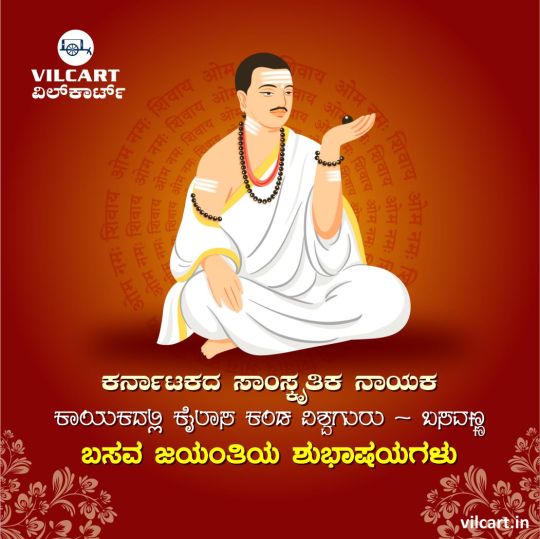

"ನುಡಿದರೆ ಮುತ್ತಿನ ಹಾರದಂತಿರಬೇಕು" ಎಂದರು- 12 ನೇ ಶತಮಾನದ ಶ್ರೇಷ್ಥ ದಾರ್ಶನಿಕ, ಸಮಾಜ ಸುಧಾರಕ, ಕವಿ, ರಾಜನೀತಿಜ್ಞ - ಬಸವಣ್ಣನವರು,
"ಬಸವ ಜಯಂತಿಯ ಶುಭಾಶಯಗಳು"
"Your Words Should be like Pearls" said Basavanna- A great 12th Century philosopher, social reformer, poet and statesman,
"Happy Basava Jayanti"
#BasavaJayanti#vishwagurubasavanna#ಬಸವಣ್ಣ#ruralindia#ruralkirana#kiranastore#basavanna#basavannaquote#vilcart#basavannajayanti#grocery store#ecommerce#grocery#groceryshopping#rural#food#retail#health & fitness
0 notes
Text
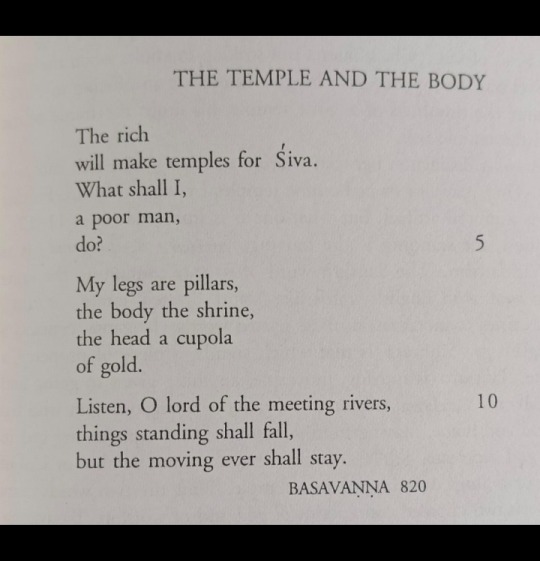
0 notes
Text
Karnataka dissolves textbook review committee, agrees to revisit chapter on Basavanna
Karnataka dissolves textbook review committee, agrees to revisit chapter on Basavanna
Karnataka dissolves textbook review committee, agrees to revisit chapter on Basavanna
CM Bommai emphasized that the government is open to further revision in case of any objectionable content.
CM Bommai emphasized that the government is open to further revision in case of any objectionable content.
Go to Source
View On WordPress
0 notes
Text
Karnataka dissolves textbook review committee, agrees to revisit chapter on Basavanna
Karnataka dissolves textbook review committee, agrees to revisit chapter on Basavanna
Karnataka state government has announced the dissolution of the state textbook review committee. The move comes amid a controversy over textbook revisions. Chief Minister Basavaraj Bommai on Friday said that the committee has been disbanded since its designated work had concluded. Bommai emphasized that the government is open to further revision in case of any objectionable content.
Several seers…
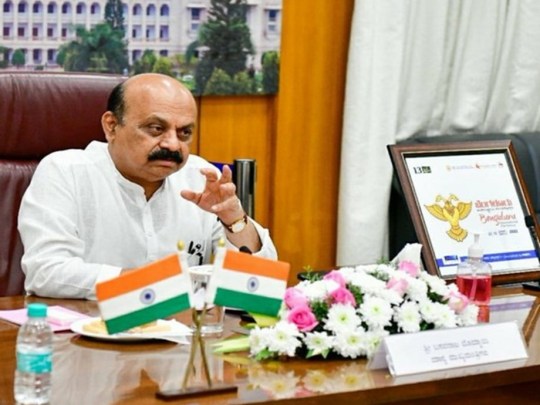
View On WordPress
0 notes
Text
[Why Get Angry]
Why Sir, do you get angry at someone?
Who is angry with you? What are you
going to gain by it? How is he going
to lose by it? Physical anger brings
dishonor... mental anger disturbs
your thinking. How can the fire in
your house burn the Neighbour's
house without engulfing your own?
(Basavanna)
24 notes
·
View notes
Video
youtube
🕉️ MUSICAL 63 NAYANMARS 🕉️
# 1. AANAAYAR - Musical Periya Puranam of Kesava Mudaliar 🕉️
🌟 Ram MohanK In Arunachala - @RamMohanABvideos 🌟
🌟 In search of Sri Ramana and Arunachala Grace 🌟
🕉️
Periya Puranam - The Lives of the Sixty-Three Saivite Saints
The Periya Puranam in Tamil and Siva-bhakta Vilasam in Sanskrit are great devotional and spiritual classics which attract many aspirants, right from the 12th century Basavanna of karnataka and saints like Ramalinga vallalar and Bhagavan Ramana Maharishi of recent times. Countless spiritual seekers are inspired by these scriptures.
In the past 1000 years, apart from numerous prose works on the lives of the 63 Saints based on the Periya Puranam, many poets have also composed melodious poems.
Of these, Kesava Mudaliar’s simple composition covering the core incidents of the 63 Saints’ lives, is being presented in these videos. An English gist of the poems is also added to convey the meaning of the poems. The Tamil verses from Kesava Mudaliyar's original print (published in 1865) is also reproduced as it is in the videos.
All songs have been rendered in their original musical notes (Raagam & Taalam), with great devotion and dedication by Ms.Mylai Divya Sundar of Chennai.
It is intended to post 2 or 3 videos per week (a video for each of the 63 Saints). Therefore, the whole project may last a few months (with in-between breaks for other videos that may come up).
Finally and most importantly, these video are the dedicated hard work of a co-bhakta of Bhagavan Ramana, who compiled all the ingredients of the videos AND of Ms. Mylai Divya Sundar for her devoted renditions. I have only put the skin, so to speak, over the real flesh and bones! Hope viewers will derive immense devotional benefit from this Series.
# 1. AANAAYA NAAYANAAR
Audio: Aanaayar from Tiru Thondar Puranam rendered by Ms. Mylai Divya Sundar.
🌟
Aanayar, a siva bhakta tended his cows feeding them with Panchak-shari* playing on his flute. Once he saw a bunch of Kondrai flowers that reminded him of the Lord Parama-siva. He played his flute with due melody and Nature itself melted with that music, Parama-siva and Parvathy too melted and fell in his net of devotion.
Aanayar was blessed by Lord Siva praised by Kesava**, to play the music in Kailas.
🌟
The Panchakshari* Mantra (or the "five-syllable" mantra referring to the five syllables of na, ma, śi, vā, and ya. It is associated with Shiva's mantra, Om Namah Shivaya, which also contains these syllables.
Kesava** - the name of the author of the poem is mentioned, at the end of all poems.
🌟
#youtube#Ram MohanK In Arunachala#Bhagavan Sri Ramana Maharshi#Periya Puranam#the lives of the sixty-three saivite saints#Aanaaya Naayanaar
4 notes
·
View notes
Text
the thing about me and my distilled contempt for the city of bangalore is that whenever someone mentions they love nagarjun . .
i always wonder are you talking about nagarjun the maithli poet?
or nagarjun the madras-born actor popular in telugu, tamil and a few hindi films, you know the one with the moustache?
or the other nagarjun the 3rd century buddhist philosopher fellow who possibly was an advisor to the satvahana kingdom?
it will never be - and i emphasise this vehemently - that nagarjun restaurant in bangalore. god damn that city. kempegowda, shishunala sharifa, basavanna and ferdinand kittel would be *hawk-thhoo* at what that city has become.
i was there for the duration of 2020 lockdown and more recently a few months ago, when sleep had deserted me and i was not to be trusted with my welfare. the only thing that kept me alive was spite – yes, dear reader – spite; that my corpse must not be found in bangalore. that this city must not have the pleasure of my last breath.
and here i am, breathing still.
i won, bangalore lost. loser city.
6 notes
·
View notes
Photo

Tomb of Basavanna
Kudala sangama in Bagalkot district, North Karnataka.
Basaveshwara, colloquially known as Basavanna, was a 12th-century CE Indian statesman, philosopher, poet, social reformer and Lingayat saint in the Shiva-focussed bhakti movement, and a Hindu Shaivite social reformer during the reign of the Kalyani Chalukya/Kalachuri dynasty.
(via Pixabay: Prasad Ganapule @prasadganapule69)
23 notes
·
View notes
Text

"The body is a moving temple, my legs are pillars" - Basavanna Indian Mystics
We worship our body as temple but we forgotten about the one who is enshrined in the temple. So we know only the empty temple. We go on worshipping the temple (body), but the God living in the temple is forgotten. We must worship our body as the shrine of God. The body in itself is nothing. It is luminous because of something that is beyond the body. Glory in the body is not in the body itself; it is a host. The glory is because of the guest. If you forget the guest, it is sheer indulgence. If you remember the guest, loving the body, celebration the body is part of worship...
Your body is a temple of God - Jesus
#question everything#history#ancient#ancestors#pyramid#ancient egypt#egyptian gods#egyptology#eye of horus#sphinx pharaoh#pharaohs#egyptian pharaoh#valleyofthekings#tutankhamen
2 notes
·
View notes
Text
Sri Jaga Jyothi Basaveshwara Bronze Statue
SPECIFICATIONS
Height15 inchesWeight17.8 KgsMaterialBronzeProduct IdPS02666
Bring home the Power & Radiance of the exquisitely crafted fine finish quality Sri Jaga Jyothi Basaveshwara (Basavanna) Bronze Statue by PujaSanskaram.
Delivery time
Upto 7 days for delivery locations inside India + No Delivery Charges.
Upto 20 days for delivery locations outside India + Additional Delivery…
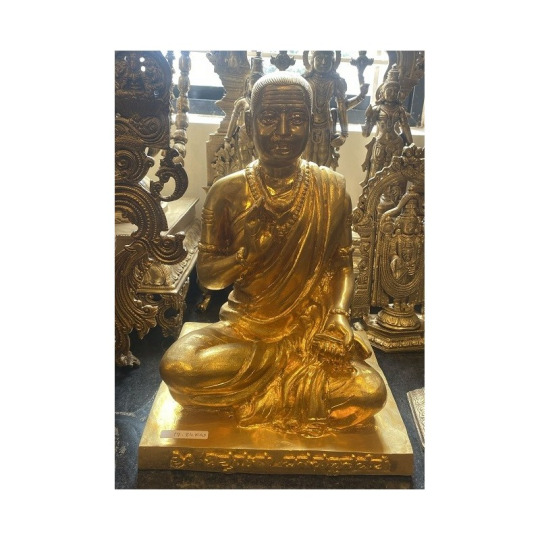
View On WordPress
0 notes
Text
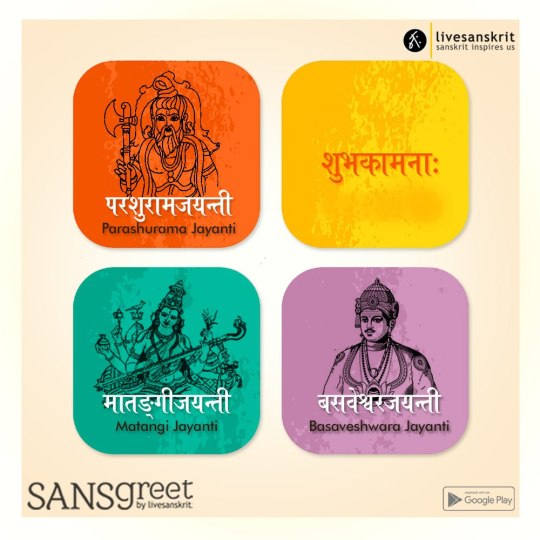
Send from Sansgreet Android App. Sanskrit greetings app from team @livesanskrit .
It's the first Android app for sending @sanskrit greetings. Download app from throw://livesanskrit.com/sansgreet
Parashurama Jayanti.
Parashurama Jayanti is celebrated as birth anniversary of sixth incarnation of Lord Vishnu. It falls during Shukla Paksha Tritiya in the month of Vaishakha. It is believed that Parashurama was born during Pradosh Kala and hence the day when Tritiya prevails during Pradosh Kala is considered for Parashurama Jayanti celebrations. The purpose of the sixth incarnation of Lord Vishnu is to relieve the Earth's burden by exterminating the sinful, destructive and irreligious monarchs that pillaged its resources and neglected their duties as kings.
Matangi Jayanti.
Goddess Matangi is regarded as the 9th of the significant Dasa (ten) Mahavidhyas (Goddesses of Wisdom). The Goddess is also famous by the name of "Tantric Saraswati" because of the fact that the deity is related to the art of magic (Tantric Vidya). According to the Hindu calendar, the occasion of Matangi Jayanti is celebrated in the month of Vaisakh during the Shukla Paksha on the 3rd day. As per the Gregorian calendar, the day is celebrated in the month of May or April.
Basava Jayanti.
Basava Jayanthi is a holiday traditionally observed by the Lingayats of the Indian state of Karnataka. It marks the birthday of Basavanna, a 12th century poet-philosopher and the founding saint of the Lingayat tradition. The holiday is celebrated throughout South India, primarily in Karnataka, Maharashtra, Telangana and Andhra Pradesh. Basavanna believed in a society free of the caste system, with equal opportunity for all. He founded the Anubhava Mantapa, an academy which included Lingayat mystics, saints, and philosophers.
#sansgreet #sanskritgreetings #greetingsinsanskrit #sanskritquotes #sanskritthoughts #emergingsanskrit #sanskrittrends #trendsinsanskrit #livesanskrit #sanskritlanguage #sanskritlove #sanskritdailyquotes #sanskritdailythoughts #sanskrit #resanskrit #celebratingsanskrit #basavanna #basavajayanti #parashurama #parashuramajayanthi #matangijayanti #matangi #goddessmatangi #basava #lingayat
#greetingsinsanskrit#sanskritgreetings#sanskrittrends#trendsinsanskrit#livesanskrit#sanskrit#celebratingsanskrit#incredibleindia#indianarmy
0 notes
Text

ನಿಮಗೆಲ್ಲರಿಗೂ ಬಸವಣ್ಣನ ಜಯಂತಿಯ ಶುಭಾಶಯಗಳು
#lingayatmatrimony #lingayats #lingayatadharma #Lingayatcommunity #bhovicaste #bhovi #polite #matrimony #basavanna #Jayanthi #dharma #First #karnataka #banglore #100matrimony #vokkaliga #gowda #brahmin #shetty #REDDDY
0 notes
